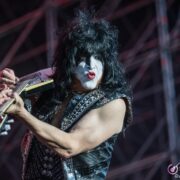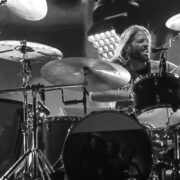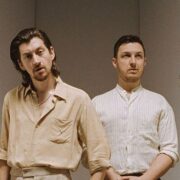Reduce dalla pubblicazione del terzo album in studio della sua band, i Whispering Sons, la cantante Fenne Kuppens ci ha raccontato qualcosa in più su “The Great Calm”. Tra le influenze dietro il disco, il processo di scrittura dei nuovi brani ed un nuovo sound, Fenne è tornata anche un po’ indietro nel tempo a quando il gruppo si è conosciuto, rivelando come ha sviluppato il suo particolarissimo modo di cantare.
— SCROLL DOWN TO READ THE ENGLISH VERSION —
Ciao! Prima di tutto grazie per il tuo tempo e benvenuta su SpazioRock. Il vostro nuovo album “The Great Calm” è finalmente fuori. Come vi sentite a riguardo?
L’album è finito a marzo dell’anno scorso quindi abbiamo dovuto aspettare un bel po’ di tempo. Però ora è finalmente qui ed è grandioso! Ci abbiamo lavorato tanto e messo molto impegno in quest’album, siamo molto orgogliosi del risultato.
Avete realizzato un paio di singoli per lanciare l’album e sono davvero diversi l’uno dall’altro. Ad esempio “Cold City” è nostalgico mentre “The Talker” ha un sound più gioioso. Come spieghereste questo contrasto?
“The Great Calm” è molto vario e dinamico. Con i singoli che abbiamo pubblicato volevamo già offrire un assaggio delle diverse facce dell’album sia nel sound che nelle tematiche. Un fattore che ha contribuito sicuramente in questo è stato il fatto che abbiamo prodotto quest’album da soli, quindi avevamo il completo controllo creativo. Ci siamo presi parecchio tempo per sperimentare con sonorità e strumenti nuovi e non ci siamo tirati indietro nei confronti di cose che erano un po’ inusuali per noi. Alla fine abbiamo solo scelto le canzoni migliori da mettere nell’album e queste canzoni variano da pezzi trainati da chitarre energiche a più fragili fino a qualsiasi cosa ci sia nel mezzo. Queste sono solo varie parti di quello che i Whispering Sons vogliono fare.
Il video di “Cold City” è un altro capitolo del cortometraggio “Balm (After Violence)”, presentato in anteprima al Film Fest di Gand e al Left Of The Dial di Rotterdam con una proiezione speciale e una performance dal vivo. Anche nei testi c’è un richiamo della seconda alla precedente, c’è quindi un collegamento tra le due canzoni?
Insieme a Heleen Declercq abbiamo creato tre video che insieme formano un cortometraggio intitolato “Balm (After Violence)”. Quel cortometraggio in realtà è più una traduzione visiva o un’interpretazione dell’intero album che delle singole canzoni. Ciò non significa che le canzoni non siano collegate. Tutte le canzoni dell’album sono collegate tra loro, in un modo o nell’altro. Profondamente nascosta, c’è una storia che scorre in tutti i testi. I fili conduttori più evidenti sono le immagini utilizzate; fuoco, inverno, ecc. che, spero, creino un’ambientazione chiara che non cambia mai. Tutti i personaggi dell’album lottano per questa idea di grande calma, e in quella ricerca non sono più semplici spettatori passivi, ma iniziano a prendere in mano la situazione.
“The Great Calm” suona come un’evoluzione dei vostri precedenti lavori “Image” del 2018 e “Several Others” del 2021. Com’è cambiato il vostro sound durante questi anni?
Siamo sicuramente cresciuti come musicisti e anche i nostri gusti musicali sono cambiati molto. Siamo influenzati da una gamma musicale più ampia rispetto a quando abbiamo iniziato con la band. D’altro canto vogliamo continuare ad evolverci e siamo molto critici con noi stessi. Quando guardiamo indietro a ciò che abbiamo creato, diventa molto chiaro cosa ci piace e cosa non ci piace e cosa vogliamo cambiare. “Image” era grandioso, “Several Others” era oscuro e minimalista. Questo album non è niente di tutto questo. Questo sembra più aperto, più ampio, persino più pieno di speranza. “The Great Calm” è, in questo momento, l’album che volevamo realizzare e che ci sembra più fedele.
Il vostro batterista originale Sander Pelsmaekers ha dovuto abbandonare la musica dopo aver subito danni ai nervi e nel frattempo ha assunto anche il ruolo di tour manager del gruppo, ma ora è tornato ai sintetizzatori. Il bassista Tuur Vandeborne è passato alla batteria, mentre il vostro tecnico di lunga data, Bert Vliegen, si è unito al basso. Questo cambio di formazione ha in qualche modo influito sul vostro sound attuale?
Ci stavamo preparando per iniziare il tour di “Several Others” quando Sander ha dovuto mollare a causa di un infortunio al braccio. Quindi abbiamo dovuto cambiare rapidamente marcia. Ma questa transizione in realtà è andata molto bene e Sander non ha mai veramente lasciato la band. Veniva ancora in tour come nostro tour manager ed era sempre coinvolto nel processo di scrittura delle nuove canzoni. Quindi quando abbiamo iniziato il nuovo album, avevamo Tuur alla batteria, che ha uno stile più convenzionale, e Bert al basso, che è lui stesso un produttore. Ciò ovviamente ha influenzato la scrittura delle canzoni per questo album. La registrazione dell’album è diventata anche una vera e propria collaborazione, in cui ogni membro della band ha potuto esprimere qualcosa di sé e non limitarsi al proprio strumento.

Voi siete originari del Belgio, ma le vostre canzoni sono in lingua inglese. Come mai questa scelta? Pensate si addica meglio al genere che proponete?
Non è stata necessariamente una decisione consapevole; mi è sembrato più naturale scrivere in inglese. Ho studiato letteratura inglese, quindi ho qualche affinità con la lingua. La maggior parte della poesia che leggo è anche in inglese.
Hai una voce molto particolare, che tra l’altro si incontra perfettamente con la musica del gruppo. Avevi già sviluppato per conto suo questo mondo di cantare oppure è nato facendo musica insieme?
Non avevo mai cantato in una band prima dei Whispering Sons, quindi ho scoperto la mia voce attraverso la band. Nei nostri primi demo cantavo con un tono più alto, ma dopo un po’ ho scoperto che mi sentivo molto più a mio agio se cantavo con una voce più profonda. Ovviamente anche questo si evolve. Per questo album, ad esempio, ho preso alcune lezioni di canto, perché l’estensione di questo disco è un po’ più ampia rispetto a prima, e mi mancava la fiducia necessaria per farcela.
Il post-punk degli anni ’80 sembra essere una grande fonte di ispirazione per la vostra band. Visto che siete tutti giovani, come siete venuti a contatto con queste sonorità?
Quando abbiamo fondato la band, ascoltavamo principalmente quel tipo di musica attraverso artisti del calibro di Editors o Interpol, e poi abbiamo iniziato a indagare da dove quelle band prendevano il loro suono. È stata la musica attraverso la quale abbiamo imparato a suonare e a far parte di una band. Il nostro vocabolario musicale per così dire. Ora, quasi dieci anni dopo, le cose sono ovviamente cambiate molto. Ascoltiamo a malapena le band degli anni ’80. Ma quel vocabolario musicale è ancora insito nella nostra musica, anche se speriamo di riuscire a farne le nostre cose.
Com’è la scena post-punk nel vostro paese?
Quando abbiamo iniziato, eravamo profondamente radicati in una scena più post-punk/new wave. Immagino che la scena sia ancora viva e vegeta, ma non ne facciamo più parte.
Quali sono i vostri progetti per il futuro?
Vogliamo solo fare un sacco di concerti per promuovere questo album, e vedremo dove questo ci porterà!
Grazie mille per quest’intervista. Vuoi lasciare un messaggio ai nostri lettori?
Spero vi piaccia il nostro nuovo album e ci vedremo ad uno dei nostri concerti!
— ENGLISH VERSION —
Hey! First of all, thank you for taking some time for this interview with us and welcome to SpazioRock! Your new album “The Great Calm” is finally out. How do you feel about it?
The record has been finished since March last year, so it has been quite a long wait. But now it’s finally here, it really feels great! We’ve put a lot of work and effort in this album, and we’re extremely proud of the result.
You’ve released a few singles leading up to the album launch and they’re very different from one another. “Cold City” is more nostalgic, while “The Talker” has a more joyful sound. How would you explain this contrast?
‘The Great Calm’ is very varied and dynamic. And with the singles we released we already wanted to offer a glimpse into those different facets of the album’s overall sound and theme. A contributing factor to this is of course that we produced this album ourselves, so we had full creative control. We took a lot of time to experiment with sounds and different instruments, and we did not shy back of things that felt a bit unusual for us. In the end, we just chose the best songs to put on the album, and those songs range from high-energy guitar-driven tracks to very small and fragile ones to everything in between. Those are all just different sides to what Whispering Sons is or wants to do.
The video for “Cold City” is another chapter of the short film “Balm (After Violence)”, shown for the first time at the Film Fest of Gand and at Left Of The Dial in Rotterdam with a very special projection and live performance. Also the lyrics of the song remind of the first one. So, is there a connection between these two songs?
Together with Heleen Declercq we’ve created three videoclips that together form a short movie called ‘Balm (After Violence)’. That short movie is actually more a visual translation or interpretation of the whole of the album than it is of the separate songs. That doesn’t mean that the songs aren’t connected. All of the songs on the album are linked together, one way or the other. Deeply hidden, there is a story running throughout the lyrics. The most obvious common threads are the images used; fire, winter, etc. which, I hope, create a clear setting that never changes. All the character on the album strive for this idea of the great calm, and in that search they are no longere merely passive onlookers, but start to take matters into their own hands.
“The Great Calm” sounds like an evolution of your previous albums “Image” (2018) and “Several Others” (2021). How do you think your sound has changed during these years?
We’ve definitely grown as musicians and even our musical tastes have changed a lot. We’re influenced by a broader range of music than we were when we first started out with the band. On the other hand, we want to keep on evolving and we’re very critical of ourselves. When we look back on what we created, it becomes very clear what we like and what we don’t like, and what we want to change. ‘Image’ was very grand, ‘Several Others’ was dark and minimalistic. This album is neither of that. This one sounds more open, more broad, more hopeful even. ’The Great Calm’ is, at this moment in time, the album that we wanted to make and which feels most true to us.
Your original drummer Sander Pelsmaekers had to abandon music after an injury to his nerves, he became the tour manager of the band and now he plays synths. Your bassist Tuur Vandeborne is now the drummer, while your technician Bert Vliegen plays bass. Has this change in your line-up influenced your sound in some way?
We were preparing to start touring for ‘Several Others’ when Sander fell out because of his arm injury. So we quickly had to shift gears. But that transition actually went very smoothly and Sander never really left the band. He still came along on tour as our tourmanager and he always remained involved in the writing process of new songs. So when we started the new album, we had Tuur on drums, who has a more conventional style of drumming, and Bert on bass, who is a producer himself. That obviously influenced the songwriting for this album. The recording of the album also became a true collaboration, in which every band member could express something of himself and wasn’t limited to his own instrument.

You’re from Belgium but your lyrics are written in english. What’s the reason for this choice? Do you think this language fits better with your sound?
It wasn’t necessarily a conscious decision; it just felt more natural for me to write in English. I’ve studied English literature, so I have some affinity with the language. Most of the poetry I read is in English as well.
You have a very particular voice that perfectly fits with the sound of the band. Was this way of singing developed while making music together or was it developed before?
I’ve never sung in bands before Whispering Sons, so I sort of found my voice through the band. In our first demos I sang in a higher pitch, but after a while I discovered that I felt a lot more comfortable if I sang with a deeper voice. Obviously, that also evolves. For this album, for example, I took some singing lessons as preparation, because the range on this record is a bit broader than before, and I lacked the confidence to pull it off.
80s post-punk music seems to be a great inspiration for your band. You’re all very young, so how did you get into this genre?
When we started the band, we mostly listened to that sort of music through the likes of Editors or Interpol, and then started to dive where those bands got their sound from. It was the music through which we learned how to play music and be in a band. Our musical vocabulary so to speak. Now, almost ten years later, that has obviously changed a lot. We barely listen to 80s bands anymore. But that musical vocabulary is still inherent in our music, although we hope that we manage to do our own thing with it.
Can you tell us more about the post-punk scene in your country?
When we first started out, we were deeply rooted within a more post-punk/new wave scene. I guess the scene is still alive and kicking, but we’re not so much part of it anymore.
What are your plans for the future?
We just want to play a lot of shows to promote this album, and we’ll see where that brings us!
Thank you very much for this interview! Would you like to leave a message to our readers?
We hope you enjoy the album and that we’ll see you at one of our shows!











